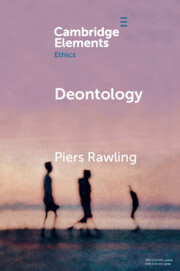References
Aquinas, T. (1988) (13th c). ‘Summa Theologica II-II, Q. 64, art. 7, “Of Killing”’. In Baumgarth, W. P. and Regan, R. J. (eds.) On Law, Morality, and Politics, Indianapolis, IN: Hackett, 226–7.
Audi, R. (1996) ‘Intuitionism, Pluralism, and the Foundations of Ethics’. In Sinnott-Armstrong, W. and Timmons, M. (eds.) Moral Knowledge: New Readings in Moral Epistemology, Oxford: Oxford University Press, 101–36.
Audi, R. (2004) The Good in the Right: A Theory of Intuition and Intrinsic Value, Princeton, NJ: Princeton University Press.
Broad, C. D. (1930) Five Types of Ethical Theory, New York: Harcourt, Brace.
Copp, D. (ed.) (2006) Oxford Handbook of Ethical Theory, Oxford: Oxford University Press.
Dancy, J. (1998) ‘Wiggins and Ross’. Utilitas, 10: 281–5.
Dancy, J. (2004) Ethics without Principles, Oxford: Clarendon Press.
Darwall, S. (1998) ‘Under Moore’s Spell’. Utilitas, 10: 286–91.
Darwall, S. (2006) ‘Morality and Practical Reason: A Kantian Approach’ in Copp 2006, 282–320.
Dreier, J. (2011) ‘In Defense of Consequentializing’. In Timmons, M. (ed.) Oxford Studies in Normative Ethics, Volume 1, Oxford: Oxford University Press, 97–119.
Ebels-Duggan, K. (2011) ‘Kantian Ethics’. In Miller, C. (ed.) The Continuum Companion to Ethics, London: Bloomsbury, 168–89.
FitzPatrick, W. J. (2012) ‘The Doctrine of Double Effect: Intention and Permissibility’. Philosophy Compass, 7(3): 183–96.
Fohr, S. A. (1998) ‘The Double Effect of Pain Medication: Separating Myth from Reality’. Journal of Palliative Medicine, 1: 315–28.
Foot, P. (1967) ‘The Problem of Abortion and the Doctrine of Double Effect’. Oxford Review No. 5 (reprinted in Virtues and Vices and Other Essays, Berkeley, CA: University of California Press, 1978).
Geach, P. T. (1956) ‘Good and Evil’. Analysis, 17: 32–42.
Hare, R. (1963) Freedom and Reason, Oxford: Oxford University Press.
Hooker, B. (2000) Ideal Code, Real World, Oxford: Clarendon Press.
Hursthouse, R. (1999) On Virtue Ethics, Oxford: Oxford University Press.
Jackson, M. and Smith, M. (2006) ‘Absolutist Moral Theories and Uncertainty’. The Journal of Philosophy, 103(6): 267–83.
Jamieson, D. (ed.) (1999) Singer and His Critics, Hoboken, NJ: Wiley.
Kagan, S. (1984) ‘Does Consequentialism Demand Too Much?’ Philosophy and Public Affairs, 13: 239–54.
Kagan, S. (1989) The Limits of Morality, Oxford: Clarendon Press.
Kant, I. (1993) [1785] Grounding for the Metaphysics of Morals, 3rd ed., translated by J. W. Ellington, Indianapolis, IN: Hackett.
Kant, I. (2015) [1788] Critique of Practical Reason, rev. ed., translated by M. Gregor, translation revised by Reath, A., Cambridge: Cambridge University Press.
Katz, L. (1996) Ill-Gotten Gains: Evasion, Blackmail, Fraud and Kindred Puzzles of the Law, Chicago, IL: University of Chicago Press.
Kavka, G. S. (1983) ‘The Toxin Puzzle’. Analysis, 43(1): 33–6.
Mackie, J. (1977) Ethics: Inventing Right and Wrong, Harmondsworth: Penguin Books.
McNaughton, D. and Rawling, P. (1991) ‘Agent-Relativity and the Doing–Happening Distinction’. Philosophical Studies, 63: 167–85.
McNaughton, D. and Rawling, P. (2006) ‘Deontology’. In Copp 2006, 424–58.
McNaughton, D. and Rawling, P. (2013) ‘Intuitionism’. In LaFollette, H. and Persson, I. (eds.) The Blackwell Guide to Ethical Theory, 2nd ed., Hoboken, NJ: Wiley-Blackwell, 287–310.
Moore, G. E. (1966) [1903] Principia Ethica, Cambridge: Cambridge University Press.
Moore, G. E. (1912) Ethics, London: Williams & Norgate.
Moran, K. A. (2022) Kant’s Ethics, Cambridge: Cambridge University Press
Nagel, T. (1970) The Possibility of Altruism, Princeton, NJ: Princeton University Press.
Nagel, T. (1986) The View from Nowhere, Oxford: Oxford University Press.
Nelkin, D. K. and Rickless, S. C. (2014) ‘Three Cheers for Double Effect’. Philosophy and Phenomenological Research, 89(1): 125–58.
Parfit, D. (1984) Reason and Persons, Oxford: Oxford University Press.
Parfit, D. (2011) On What Matters, Oxford: Oxford University Press.
Pettit, P. (1987) ‘Universalizability without Utilitarianism’. Mind, 96: 74–82.
Phillips, D. (2019) Rossian Ethics: W.D. Ross and Contemporary Moral Theory, Oxford: Oxford University Press.
Portmore, D. (2011) Commonsense Consequentialism: Wherein Morality Meets Rationality, Oxford: Oxford University Press.
Portmore, D. (ed.) (2020) The Oxford Handbook of Consequentialism, Oxford: Oxford University Press.
Quinn, W. S. (1989a) ‘Actions, Intentions, and Consequences: The Doctrine of Double Effect’. Philosophy and Public Affairs, 18: 334–51.
Quinn, W. S. (1989b) ‘Actions, Intentions, and Consequences: The Doctrine of Doing and Allowing’. Philosophical Review, 98(3): 287–312.
Rachels, J. (1975) ‘Active and Passive Euthanasia’. New England Journal of Medicine, 292: 78–86.
Ross, W. D. (1930) The Right and the Good, Indianapolis, IN: Hackett.
Ross, W. D. (1939) The Foundations of Ethics, Oxford: Clarendon Press.
Scanlon, T. M. (1998) What We Owe to Each Other, Cambridge, MA: Harvard University Press.
Scanlon, T. M. (2008) Moral Dimensions: Permissibility, Meaning, Blame, Cambridge, MA: Belknap Press of Harvard University Press.
Scheffler, S. (ed.) (1988) Consequentialism and Its Critics, Oxford: Oxford University Press.
Scheffler, S. (1994) The Rejection of Consequentialism, rev. ed., Oxford: Clarendon Press.
Singer, P. (1972) ‘Famine, Affluence, and Morality’. Philosophy & Public Affairs, 1(3): 229–43.
Snow, N. E. (2020) Contemporary Virtue Ethics, Cambridge: Cambridge University Press.
Suikkanen, J. (2020) Contractualism, Cambridge: Cambridge University Press.
Sykes, N. and Thorns, A. (2003) ‘The Use of Opioids and Sedatives at the End of Life’. The Lancet Oncology, 1: 312–18.
Taurek, J. M. (1977) ‘Should the Numbers Count?’ Philosophy and Public Affairs, 6(4): 293–316.
Thomson, J. J. (1985) ‘The Trolley Problem’. The Yale Law Journal, 94(6): 1395–415.
Thomson, J. J. (2008) ‘Turning the Trolley’. Philosophy and Public Affairs, 36(4): 359–74.
Wiggins, D. (1998) ‘The Right and the Good and W. D. Ross’s Criticism of Consequentialism’. Utilitas, 10: 261–80.
Woollard, F. (2012a) ‘The Doctrine of Doing and Allowing I: Analysis of the Doing/Allowing Distinction’. Philosophy Compass, 7(7): 448–58.
Woollard, F. (2012b) ‘The Doctrine of Doing and Allowing II: The Moral Relevance of the Doing/Allowing Distinction’. Philosophy Compass, 7(7) 459–69.

 Loading metrics...
Loading metrics...


